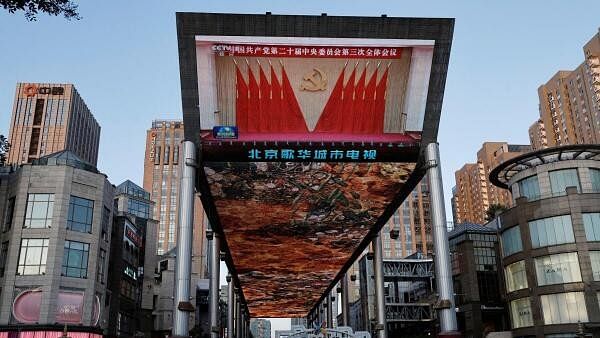
Giant screen shows news footage of the third plenary session of the 20th Central Committee of the Communist Party of China (CPC), in Beijing.
Credit: Reuters File Photo
After being postponed for months for unexplained reasons, the Third Plenum of the 20th Central Committee of the Communist Party of China (CPC) took place from July 15 to 18. While the finer details will only be revealed in the coming days, the meeting adopted "the decision of the CPC Central Committee on further comprehensively deepening reforms and promoting Chinese-style modernisation".
One of the key meetings that set the economic policy agenda of the party-state, and held roughly every five years, the plenum was held amid uncertainty in economic recovery, concerns about President Xi Jinping's resolve to extend the CPC’s firm control over economy and institutions, and a series of corruption cases involving senior ministers and military officers.
While the plenum has not indicated any directional change from the economic policy trajectory since 2013 when Xi took the helm of the party-state, it commended the "successful implementation" of current policies.
It has reaffirmed the commitment to a socialist market economy with Chinese-style modernisation serving as a political framework. The document committed "to better leverage" the market, a change in formulation about state-market relations from "decisive role" of the market in resource allocation in previous such documents in 2013 and 2018.
As officials stated during a press conference after the meeting, the plenum redeclared the existing policies and long-term goals. Furthermore, several policies have been unveiled in recent years. Hence, given the continuity, the change in vocabulary will practically be inconsequential.
In the run up to the plenum, official and media narratives attempted to counter the worries among the private sector, which contributes substantially to job creation, and international markets, underlining the party-state’s commitment to reform. Media hailed Xi as a committed reformer on par with Deng Xiaoping. However, the absence of new initiatives and credible reassurance in the document keeps private entrepreneurs and investors guessing about the policy directions and actions on the ground.
Affirming control
The document also emphasised balancing development and security, a code word for the party’s control over the economy. The CPC’s relationship with the economy is a vexing issue with serious consequences for the domestic economy and the outside world. In recent years, Xi has attempted to discipline the growing influence of private entrepreneurs — disorderly capital in CPC’s ideological terms — through dictates. The meeting reinforced the policymakers’ commitment to strengthen institutions and regulations, underlining that effective governance with the firm control of the CPC is key to reform.
Despite calls by economists and industry leaders for a stimulus package, the leadership has refrained from dolling out large amounts of money, signaling that the efforts to transition to a new economic model with focus on upgrading industrial structure and technological advancements will continue.
The document has also referred to planned reforms in areas such as fiscal and tax systems, land market and urban-rural integration. Despite adjustments in the tax-sharing mechanisms over time, local governments below provinces — struggling fiscally with huge debts — are deprived of sufficient tax revenue and budgetary transfers from provincial governments.
While the document emphasises "coordinated" reform of fiscal, tax system and other policy areas, how these guidelines translate into practical policies is key. Despite calls for significant reforms to deal with the huge local debt and maintain local governments fiscally healthy, reforms are easier said than done and remain one of the biggest challenges before Xi.
Corruption saga continues
The meeting also formally removed the former foreign minister Qin Gang from the 20th Central Committee. However, despite his unexplained and sudden disappearance, he might be spared from a trial. In contrast, his former colleague and defense minister, Gen. Li Shangfu, and several other officials from the PLA Rocket Force (PLARF) were expelled from the party for violating party discipline, a reference to corruption.
In a sign of the never-ending corruption saga in the PLA, another former official of the PLARF and a sitting alternate member of the Central Committee lost his seat.
The politically significant plenum has been an occasion for Xi to consolidate his legacy. The plenum document mentioned that reforms will be completed by 2029 — unusual mention of a timeline in such documents — the year the CPC turns 80, and two years after the ongoing term of Xi Jinping ends in 2027.
Slow-growth accepted?
Self-reliance remains the main mantra while the narratives emphasised self-confidence in the party’s ability to navigate internal and external challenges. That indicates that the Chinese leadership will remain committed to achieving technological sovereignty and insulating supply chains amid geopolitical and trade tensions.
The fact that most of the policy initiatives in recent years remain in mid-way of their implementation partly explains the unchanged trajectory of policies. The heavy focus on investment in cutting-edge technologies and industrial upgrading will remain a major focus. At the same time, the policymakers do not seek quick-fix policies despite challenges at home, perhaps, indicating the acceptance of slow growth rates as the destined path for the coming decade.
Despite Xi’s firm control at the top, however, the implementation of policies at lower levels of party-state hierarchy also remains another challenge. There are indications of more top-down efforts in coming times to reinforce discipline and implement the central leadership’s vision and policies on the ground.
(The author is an Associate Fellow with the Centre of Excellence of Himalayan Studies, Shiv Nadar Institution of Eminence, Delhi. Views are personnel)